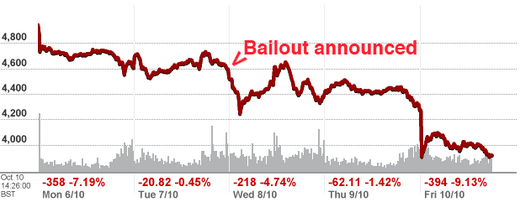The Prime Minister and the Chancellor announced their bailout before the markets opened on Wednesday, and if equity prices are any guide, the results so far are not looking promising (and yes, I also hate graphs like this where the x axis isn't zero).
What I'm now worried about is that the influential City people will say to Gordon "Oh, see your bailout, it wasn't enough: can we have some more money, please? If not, it'll be everyone's pension funds that suffer", as per the classic
Bird and Fortune sketch.
Any further reach into taxpayers' pockets won't be any more successful at stabilising the markets, and will just leave the Government with more debts to service while tax receipts drop. Also, as many have noted, the Daily Mash is
spot on with this: "The government is to invest £500bn of your money in British banks so they can lend it back to you with interest."
Surely the response should instead be driven by the actual public good? Policymakers should be looking first to protect the people with mortgages they can't pay, the councils who put it all on black in Iceland, the small businesses who can't borrow to tide themselves over, and the others who are suffering outside the Square Mile.
If that requires market intervention (which would look very different to the existing plans), so be it. Perhaps HMG should start taking equity shares in property in exchange for state-backed mortgage guarantees. Perhaps they should be using the already-nationalised banks to lend to good businesses directly, not the seized-up banks. One of the few things Vince Cable's got right about all this is when he compared lending to banks with pushing on a piece of string.
Some of the mortgage-holders (and all of the councils) have simply done the wrong thing and taken too much risk. The next step should be to ensure that these same mistakes can't be made again: no more taking our Council Tax and stashing it with the buccaneer capitalists ever again.
However, I worry that Labour will simply be terrified of the City's threats, and that they'll go ahead and shovel more money into the fire. I do hope I'm wrong.
 There are people who don't like Simon Jenkins, but I am not one of them. Even where I disagree with him, I always love his writing.
There are people who don't like Simon Jenkins, but I am not one of them. Even where I disagree with him, I always love his writing. 






